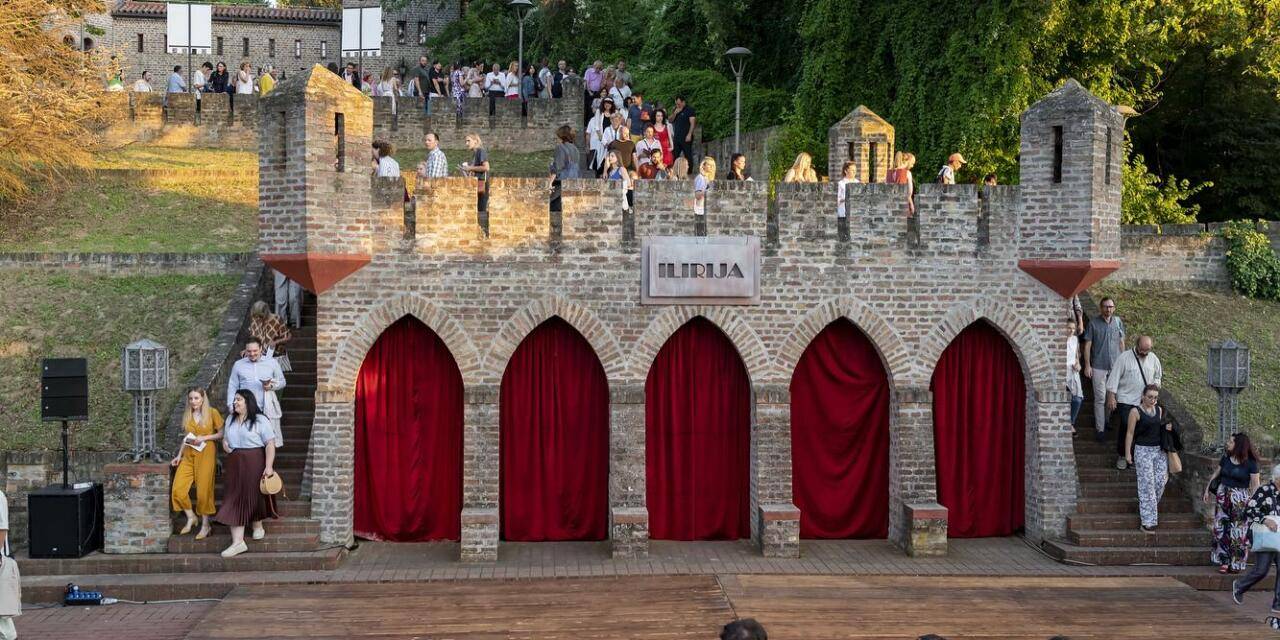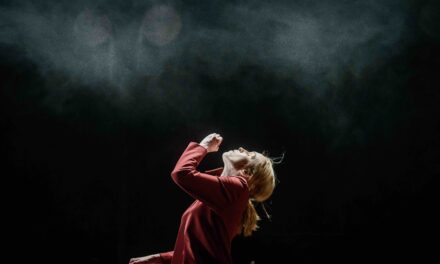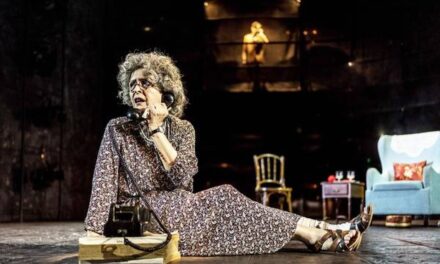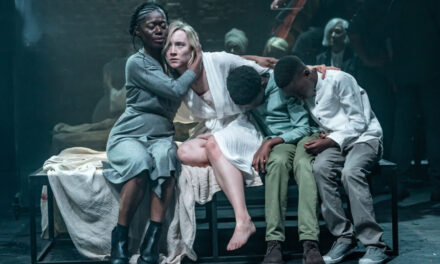The tenth in a row international theatre festival “Shakespeare Festival”, whose founder is director Nikita Milivojević, this year, held in Čortanovci, Serbia, brought top theatre productions from Armenia, Turkey, and Great Britain to the glory of the greatest theatrologist, playwright and actor, poet and philosopher, known to all, yet so unfathomable, mysterious, timeless – William Shakespeare.
Through thirty-seven plays, sonnets, two narrative poems and a few short poems, Shakespeare provides warmth to the cold art before him, builds characters from flesh and blood, and summarizes Classical antiquity and the Middle Ages, creating essentiality and universality that will make him the best creator in both dramatic genres, and include his works in the topicality of all subsequent epochs, as well as today. The combination of the history of the heavy crown of the Danish kings, the brutal conflict of Italian families, the rose flank of the English wars, the turbulent sea waters near Illyria, the golden age of Pericles’ rule, prophecies, and Macbeth’s mysticism. . . with spiritualist philosophy, in the rhythm of the Globe Theater and Shakespeare’s company, puts on the stage an endless and an endlessly suggestive imaginative play, which comes to life in a theatre that brings everything to a climax, breaks the boundaries between dream and reality, life and death, transience and eternity. As a theatre writer and a genius of a dramatic work of countless meanings, Shakespeare penetrates into the essence. His opus is reflected in the nature that he imitates and revives and, with his talent, creates his viewers of every age and time, exposing the abstraction of the drama that he shapes in sequences and realizes on stage. An author who wears two masks, a comedian and a tragedian, passing elements of one dramatic type into another through metaphors, symbols and images, secrets and catharsis, appears and delights both in the age of the Elizabethan theatre and also in future periods, as the originator of a new theatre, an overall, with the slogan Totus mundus agit histrionem (“All the world plays the player”), through his work, he will live forever, and this festival is one of the proofs of that. Four completely different performances read the writer in their own way and introduced the dimensions and elements of contemporary theatre into his dramatic works and theatre concept.
Villa Stanković, where the festival takes place, was built in 1930 on a knap place, with the name of the Golden Hill, known since Roman times, the work of architect Dragiša Brašovan modeled like Serbian medieval castles. The location is extraordinarily interesting because it is easy to see it as the palace of some Shakespearean king, lord, or general. This place also reminds people of an Elizabethan theatre because the villa is under the open sky and is small, with a walkable balcony and at least two doors, surrounded by the audience from all sides, where there is no theatre curtain.
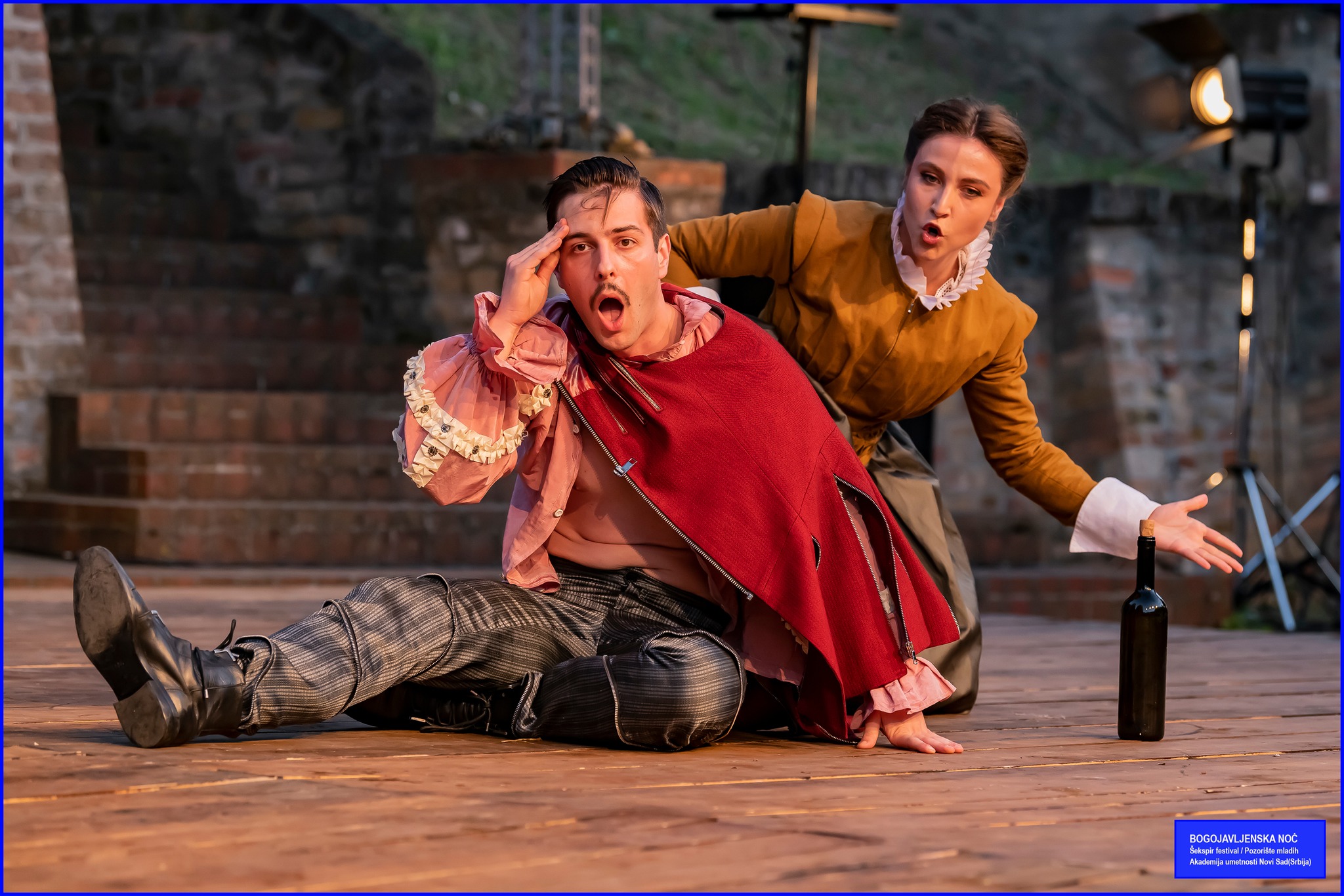
Twelfth Night Photo by Srdjan Doroski
Twelfth Night – Shakespeare for Beginners
A terrible storm drove the theatre audience to Illyria on the first night of the Shakespeare festival. The shipwreck brought with it a dramatic play of great confusion. The performance Twelfth Night, produced by the Novi Sad Youth Theater in cooperation with the Academy of Arts from Novi Sad, opened the festival by providing an opportunity for really young artists. The title of the piece, Twelfth Night, in its meaning, indicates the basic theme of the play – the night when everything turns upside down. The twelfth night of Christmas, the day of Epiphany, brings a carnival atmosphere, a night full of games in which masks exchange, peasants dress up as kings, and kings as peasants. Epiphany is a Christian holiday that celebrates the appearance of God in the human body, transformation, and change of form. Thus, Shakespeare’s text follows Viola, thrown by a storm onto the coast of Illyria. The story of love and madness through the replacement of the male and female principles, the effective symbolism of the music, and the theme of confusion form a spectacle colored by different challenges. A reflection of the style of the Elizabethan theatre that creates multiple plots, themes of separation of loved ones, stories about masters and their servants, positioning the jester in the theatre as well as in the audience, youthful playfulness and energy, the ambiance – enthralls and draws the audience into the game. The director of the play, Ivan Vanja Alač, consistently adheres to Shakespeare’s play, leaving his personal stamp of direction in miniatures, where each sequence of the dramatic play is an independent creation. The performance is part of a new festival idea called “My First Shakespeare”. In this way, the young theatre authors of Serbia got the opportunity to enter the world of sublime theatre by working on the work of the greatest theatre bard.
The young actor Miloš Macura, in the role of a Shakespearean persona, Duke Orsino, shared with us the impressions of the acting cast of the play:
“For the entire team of the play, this was an opportunity to appear in front of a different, perhaps even more critically demanding audience than usual. And that’s why this experience is significant. Of course, the very environment in which the festival is located, and where the performances are performed, makes our play at the festival even more special – because of the fact that we play more than half of the performance under the light of day and see the audience. Because of this, they also feel more exposed and involved in the story. The presence of the fourth wall was broken in that simple way (as in Shakespeare’s time), and I think that helped the play to grow and become stronger.”
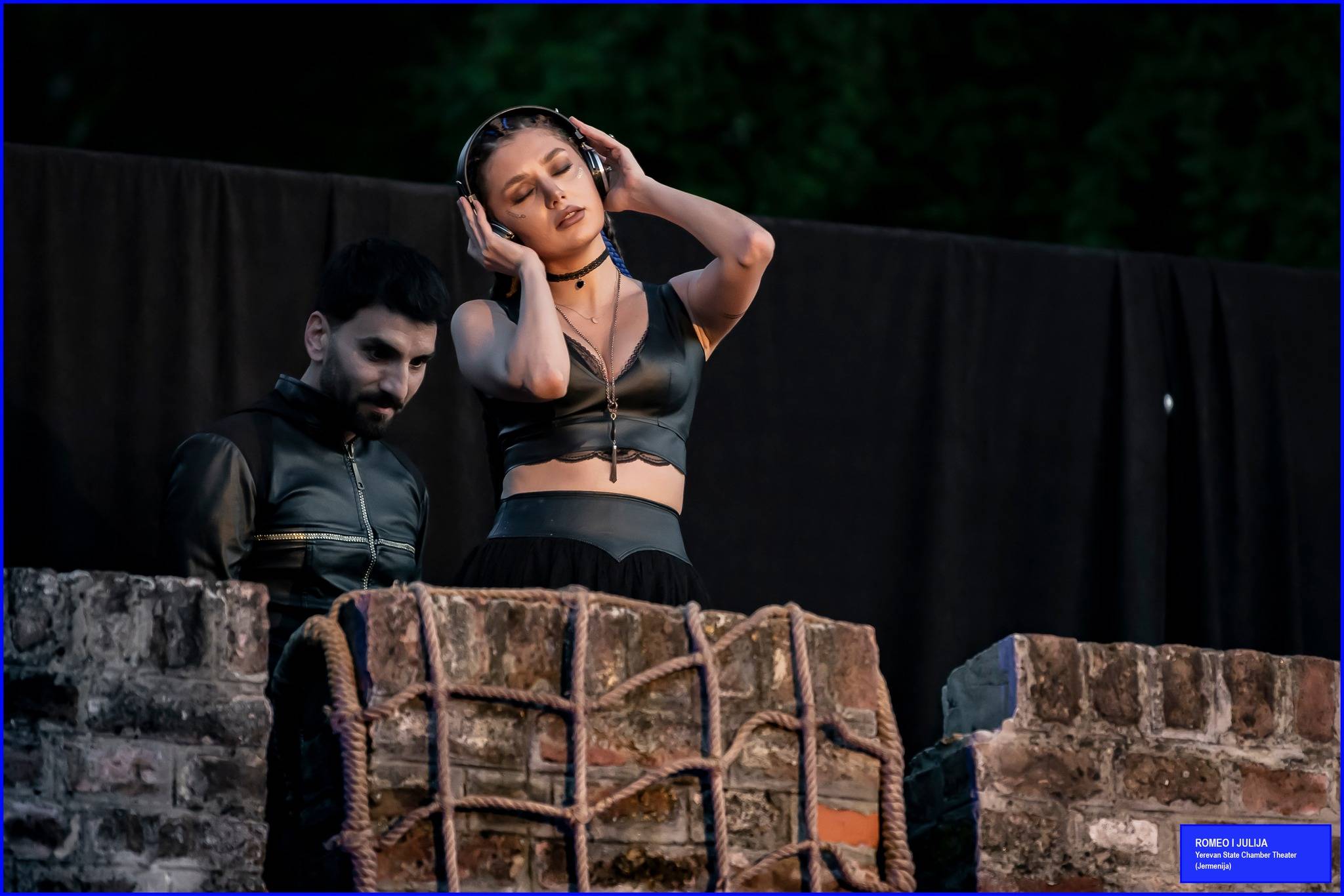
Romeo and Juliet photo by Srdjan Doroski
Romeo and Juliet
“Two households, both alike in dignity
In fair Verona where we lay our scene
From ancient grudge break the new mutiny
Where civil blood makes civil hands unclean.”
The tragic story of the love of Romeo and Juliet, of the hatred of Montagues and Capulets, the cry of all of Verona and the ravishing performance of the theatre from Armenia “Yerevan State Chamber Theater” directed by Lusine Yernjakyan is to the rhythm of the song Stairway to Heaven by Led Zeppelin. They enchanted the audience with the playful power of a large, majorly young acting ensemble and directing dynamics, with a fierce external and internal struggle played out through bold, intense stage movement. Black and burgundy costumes, red and blue stage lights, the change of day and night – the Sun and the Moon in the sky above Čortanovci, the play of love and hate, fate and death gave the audience an extraordinary and rich theatrical experience. The theme of a man in love and a poisonous society, the misery of love known to everyone, the force of violence and the game of power, the struggle of prestige and pride with youthful emotion in the shackles of the world under colorful spotlights, has been talked about for centuries, but when it comes to an excellent play, like this Armenian one, then as if speaking for the first time.
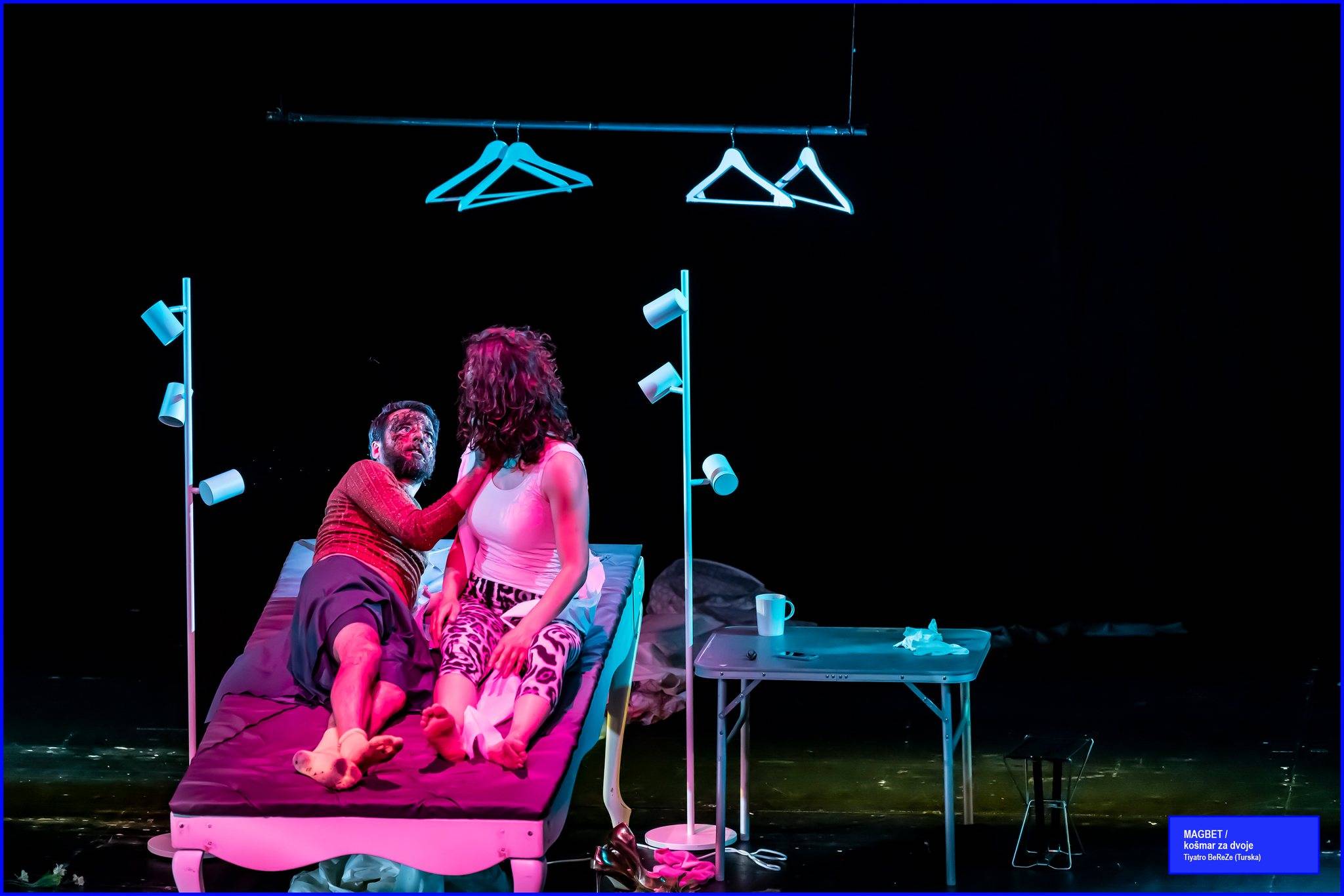
Macbeth _ a nightmare for two, Photo by Srdjan Doroski
Macbeth
On the third night of the festival, “Tiyatro BeReZe” from Turkey presented the story of Macbeth, who is stuck in insomnia, which is in this case, a nightmare. There are only two actors on stage, Macbeth (Erkan Uyaniksoy) and Lady Macbeth (Elif Temuçin). The demanding Shakespearean drama in the play “Macbeth – a Nightmare for Two” is played in a sort of tragi-comic way. Shakespeare’s crucial moments of the play unfold into images that take on the shape of the modern age. On the scene is a married couple of new times, a small apartment, a room, a bloody bed, and dirty hands. There is a penetrating sound, the echo of the thoughts of the protagonists, engraved in the stars that forge the fate of a grandiose triumph after which we see the predestination of a great fall. Disco music of collapsed souls driven by sick ambition and the false glow of fame, then abandoned by all happiness, drags Macbeth and Lady Macbeth into the deepest abyss of desolation. They become too exhausted (sleepy) for new battles, they cannot escape fate. The very unusual and unusually extraordinary direction of Doğu Akal reveals a new dimension of the classic through the grotesque, funny, and actually horrific. We were interested in the director’s guiding idea and he told The Theater Times:
“Nightmare is the central idea of our adaptation.
We tried to create a nightmare atmosphere for the Macbeth couple.
These two famous characters are stuck in a bad room.
They are having insomnia. They could not sleep any more.
They are waiting for the audience because they had to tell their story to them. They were cursed because of what they did to become kings and hold power. So this nightmare never ends, every time they finish their story it starts again.
They try to sleep again, but they can’t. Because of this famous quote from William Shakespeare;”
“Methought I heard a voice cry ‘Sleep no more!
Macbeth does murder sleep, the innocent sleep,
Sleep that knits up the ravell’d sleeve of care,
The death of each day’s life, sore labour’s bath,
Balm of hurt minds, great nature’s second course,
Chief nourisher in life’s feast…”
Pericles
“Flute Theater” from Great Britain, with its unique performance of Pericles, influenced us to get as close as possible to the beginnings of the writer’s vision. The cast of Carina de Torres, Natasha Haward, Catherine Kay, Maria Maresca, Oliver McLellan, Juan Sanchez Plaza, and Joshua Welch created the illusion of the golden age of Athens. Everything is in play in a thoroughly Shakespearean way. Actors play multiple roles at a time in sneakers and simple costumes. On stage, there is live music composed of various instruments. The audience was struck by pure emotion because the ensemble built the plot on the basis of imagination, acting, directing, and watching – united by the writer’s spiritual mechanics in the esoteric, brightest height of human knowledge. Then it is unsurprising that the play “Pericles” also plays for people with autism incorporating sensory games into the theatre. At the very end of the spectacle, we all danced.
As part of this year’s festival, on October 12, 2023, the play Shakespeare/Bach by Peter Brook’s French theatre “Théâtre des Bouffes du Nord” from Paris will be performed, directed by Sonja Wieder-Atherton, who will combine Shakespeare’s Sonnets with Bach’s compositions. The performance is planned to be on the stage of the Serbian National Theater in Novi Sad.
The famous Argentinian writer wrote a short story about the famous actor, master of sonnets, playwright, and theatre manager to whom many theatre festivals in the world are dedicated, including this one in Chortanovci. Let the last paragraph of the story Everything and Nothing be the end of our review:
“The story goes that shortly before or after his death when he found himself in the presence of God, he said: “I who have been so many men in vain want to be one man only, myself.” The voice of God answered him out of a whirlwind: “Neither am I what I am. I dreamed the world the way you dreamt your plays, dear Shakespeare. You are one of the shapes of my dreams: like me, you are everything and nothing.” (Jorge Luis Borges, Spanish, trans. Kenneth Krabbenhoft, Selected Poems, ed. Alexander Coleman, Viking Penguin, 1999)
This post was written by the author in their personal capacity.The opinions expressed in this article are the author’s own and do not reflect the view of The Theatre Times, their staff or collaborators.
This post was written by Emilija Kvočka.
The views expressed here belong to the author and do not necessarily reflect our views and opinions.

